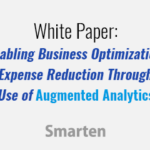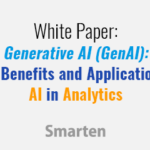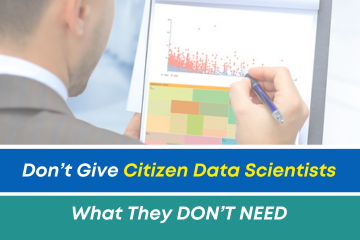
If you are an IT professional, a business manager or an executive, you have probably been following the progress of the Citizen Data Scientist movement. For a number of years, Gartner and other technology research and analysis firms have predicted and monitored the growth of this phenomenon.
In fact, Gartner predicted that, ‘…40% of data science tasks will be automated, resulting in increased productivity and broader usage by citizen data scientists.’
So, how is it going? It’s actually going quite well.
However, it is worth noting that some businesses have not had the success they expected when implementing a Citizen Data Scientist approach. One of the primary reasons for falling short of results is to set inappropriate expectations regarding the role of Citizen Data Scientists vs. Data Scientists within the organization.
As the Citizen Data Scientist approach gained momentum, businesses seemed to develop an expectation that Citizen Data Scientists could replace Data Scientists. Nothing could be further from the truth. Augmented Analytics and Citizen Data Scientists are not meant to replace refined data modeling or the role of Data Scientists, but rather can supplement and support analytics across the enterprise. The enterprise should not discount the value of strategic data analytics and its place in the organization but rather should see augmented analytics and Citizen Data Scientists as a way to drive fact-based decisions and provide clarity and data-driven actions across the enterprise.
The fact is that there is a place for Citizen Data Scientists within your business, AND a place for Data Scientists and the strategic use of their skills.
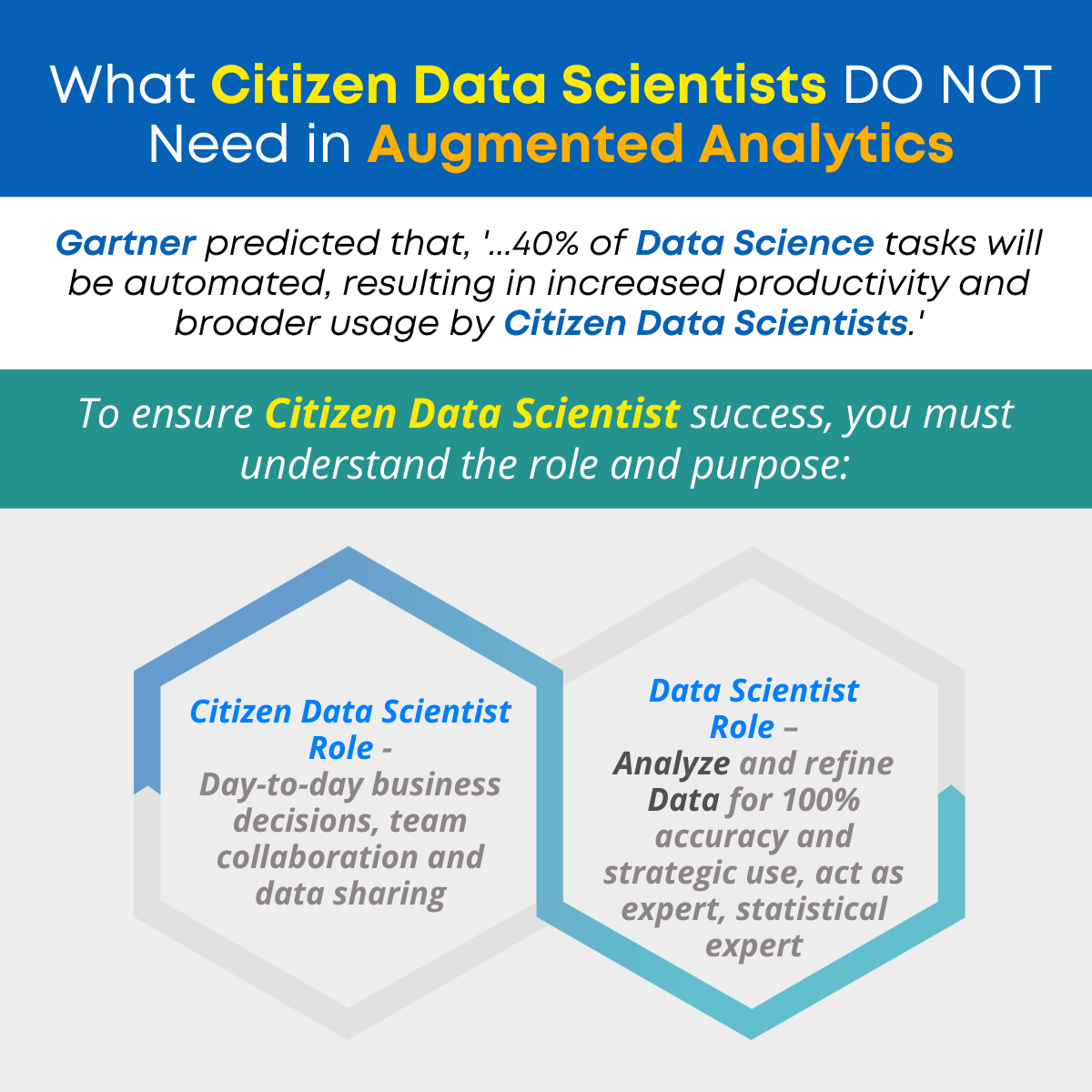
If you want your Citizen Data Scientist initiative to succeed, and you wish to achieve data democratization and data literacy, you must understand how augmented analytics should be used to support business users and organizational objectives. So, let’s dive in and explore this issue further.
AUGMENTED ANALYTICS SOLUTIONS
When selecting an augmented analytics solution, your enterprise must choose tools that are designed specifically for business users with average technology and analytical skills. Easy-to-use, intuitive tools will ensure user adoption. If you choose business intelligence or advanced analytics tools that are meant to data scientists, IT professionals or business analysts, you are setting your team up to fail. These tools are focused on the needs of Data Scientists. The tools are powerful and can produce undeniable value in the right hands, but they are not designed for your business professionals. To use these tools, users must manually gather and prepare data, scrubbing, cleaning, etc., and then write complex queries and use complicated algorithms and analytical techniques. Users must be expert in R programming or in Python or other scripting and programming languages. In short, this kind of software, app or solution is not for the feint of heart, and it’s certainly not suitable for a Citizen Data Scientist.
The right business user solution is an augmented analytics should be designed with all the tools a business user needs to get swift, dependable results.
- Self-Serve Data Preparation
- Assisted Predictive Modeling
- Smart Data Visualization
- Machine Learning and Natural Language Processing (NLP)
- Clickless Search Analytics
EXPECTATIONS AND RESULTS
Once you have chosen the right augmented analytics solution, you must establish appropriate expectations.
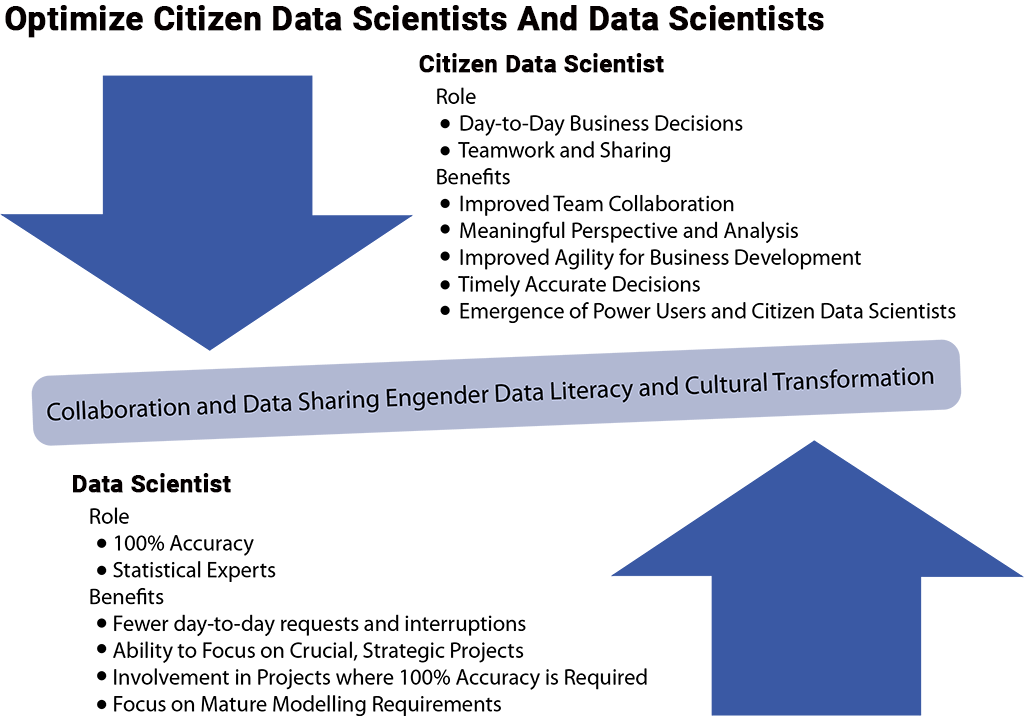
MANAGERS AND EXECUTIVES SHOULD NOT EXPECT CITIZEN DATA SCIENTISTS TO BE DATA SCIENTISTS
That is not the purpose of this strategy. The purpose of a Citizen Data Scientist approach is to give your team members tools that will allow them to discover trends and patterns, and to gain insight into what is working and what is not working in their current process, workflow and in their day-to-day activities. If and when an issue is identified that will require adapting a strategy or a major goal or objective, the enterprise must have a process in place that will allow a team member to refer her/his research to a Data Scientist, IT team member or other analytical professional, where the initial analysis will be refined and studied for use in strategic goals. When a Citizen Data Scientist uses augmented analytics, they should not be expected to perform complex modeling or to establish predictive models that will be rolled out in production mode or dictate a new strategy.
CITIZEN DATA SCIENTISTS SHOULD FOCUS ON HYPOTHESIS AND PROTOTYPING
If a business user/Citizen Data Scientist discovers an issue or an opportunity, that user can explore the issue, look for relationships among the variables and factors that affect success and failure, develop an understanding of the challenge or the possibilities for product bundling, changing a marketing campaign, etc., and then share and collaborate with the team to further analyze and discuss the issues. It is this day-to-day access to analytics and clear data that will allow business users to make fact-based decisions and to build an understanding of data and analytics and how the information contained in data repositories and software systems can be integrated and analyzed to gain more clarity and to provide real metrics and measurements, so decisions are based on facts, rather than guesswork and opinion.
Role – Day-to-day business decisions, team collaboration and data sharing.
Benefits – Improved team collaboration, improved data literacy and perspective, improved business agility, timely decisions.
DATA SCIENTISTS SHOULD FOCUS ON STRATEGIC GOALS AND DATA REFINEMENT
Most organizations cannot afford a team of Data Scientists and, even if they could, they do not want those professionals pulled away from crucial, strategic focus by day-to-day requests and projects that have short-term outcomes and importance. Rather than trying to replace Data Scientists within the business, the enterprise can optimize their time and reduce the need to hire more resources, by improving focus and enabling a workflow that allows them to concentrate on those areas that will reap the most benefit to the organization.
Role – Analyze and refine data for 100% accuracy and strategic use, act as expert, statistical expert.
Benefits – Focus on strategic issues with fewer day-to-day requests, collaborate on projects that require data refinement for 100% accuracy, focus on mature modeling requirements.
When an organization sets out to leverage the Citizen Data Scientist approach, it can ensure success by taking the time to plan appropriately AND by establishing appropriate expectations for how and when business users will engage in analytics and the results they can and should produce. When an organization understands the true meaning and purpose of the Citizen Data Scientist role, it can incorporate this strategy and align business users and Data Scientists to achieve greater collaboration and synergy.
Be sure you choose a vendor with comprehensive augmented analytics features and functionality designed specifically for business users, to support the transition of your business users to Citizen Data Scientists and ensure that your project will succeed. Contact Us to find out how we can help you plan and achieve your goals. It really IS possible!



